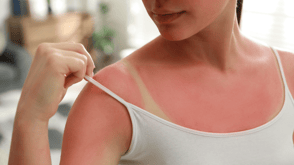 We love enjoying our summers in Northern California! This is the season when we go camping, participate in sports camps, and enjoy water based recreational activities. With all the fun we can have, it’s still important to recognize that prolonged exposure to sunlight can have harmful effects on our skin and overall health.
We love enjoying our summers in Northern California! This is the season when we go camping, participate in sports camps, and enjoy water based recreational activities. With all the fun we can have, it’s still important to recognize that prolonged exposure to sunlight can have harmful effects on our skin and overall health.
There are a few sun-related illnesses, including sun poisoning, sunburn, and sun allergy to be aware of during the warmer months ahead. We'll explore what these conditions are, how they occur, their symptoms, treatment options, and when it's necessary to seek medical care. So, grab a cool drink, find some shade, and let's learn more about the sun's potential hazards and how to stay safe.
Sunburn
Sunburn is a common condition that occurs when the skin is overexposed to UV radiation, typically from the sun. It results in painful, red, and inflamed skin. Although sunburn is often mild, it can cause long-term damage to the skin and increase the risk of skin cancer.
Causes
Sunburn is caused by the UV radiation emitted by the sun. Factors such as fair skin, lack of protective clothing or sunscreen, and being at higher altitudes or closer to the equator can increase the risk of sunburn.
Symptoms and Treatment
The symptoms of sunburn include redness, pain, swelling, tenderness, and sometimes blistering. To treat sunburn, it's important to take immediate action. Move to a shaded area or indoors to avoid further exposure to the sun. Apply cool compresses or take cool showers to soothe the affected skin. Hydrate your body by drinking plenty of water and use over-the-counter pain relievers, like ibuprofen, to reduce inflammation and discomfort.
Applying aloe vera gel or moisturizers can also provide relief. Severe cases of sunburn with extensive blistering or signs of infection may require medical attention.
Sun Poisoning
Sun poisoning, also known as photodermatitis, is an intense reaction of the skin to sunlight or ultraviolet (UV) radiation. It often occurs due to an increased sensitivity to sunlight or the use of certain medications or chemicals, but not always. Some people can be more susceptible to it because of previous sun poisoning, genetic predispositions, or other underlying medical conditions.
Causes
Sun poisoning is more likely to happen during peak sun hours, typically between 10 am and 4 pm. It can be caused by prolonged exposure to the sun without protection, sensitivity to UV radiation, certain medications (e.g., antibiotics, nonsteroidal anti-inflammatory drugs), and contact with photosensitizing substances (e.g., certain plants, perfumes, chemicals). Most prescription drugs will give a warning if you need to avoid the sun while using them.
Symptoms and Treatment
Symptoms of sun poisoning can include severe redness, swelling, blisters, headaches, and even fever or chills. It may remind you of cold and flu-like symptoms. To alleviate the symptoms of sun poisoning, it's crucial to take immediate action.
First, move to a shaded area or indoors to avoid further exposure to sunlight. Apply cool compresses to the affected areas and take over-the-counter pain relievers like ibuprofen. Hydrating your body with plenty of fluids is also essential. In severe cases, where blisters or an infection is present, seeking medical attention is recommended.
Do not attempt to cool down by submerging or exposing your body to extremely cold water. This can cause shock and create more physical problems. Use room temperature water so the body can cool down slowly.
Sun Allergy
Some individuals may experience an allergic reaction to sunlight, known as a sun allergy or photosensitivity. This condition occurs when the immune system reacts abnormally to UV radiation, leading to skin rashes, hives, or even systemic symptoms like nausea and headache.
Causes
Sun allergy can be caused by various factors, including genetic predisposition, certain medications (e.g., antibiotics, diuretics), underlying medical conditions (e.g., lupus, polymorphous light eruption), or exposure to specific substances (e.g., certain chemicals, fragrances).
Symptoms and Treatment
The symptoms of sun allergy range from mild to severe and can include redness, itching, hives, rash, or even systemic symptoms like headache and nausea. If you suspect a sun allergy, it's essential to avoid sunlight and protect your skin with clothing and sunscreen.
Over-the-counter antihistamines can help alleviate mild symptoms. However, if the symptoms are severe, persistent, or accompanied by difficulty breathing or swelling of the face and throat, seek immediate medical attention.
When to Seek Medical Care
While most cases of sunburn, sun poisoning, or sun allergy can be treated at home, certain situations warrant medical care. Consider seeking medical attention at Orchard Hospital's emergency room or walk-in clinic if:
- Sunburn covers a large area of your body, is severe, or accompanied by high fever or dehydration.
- Sun poisoning symptoms, such as severe blistering, intense pain, or signs of infection, are present.
- Sun allergy symptoms are severe, persistent, or affect your ability to breathe properly.
Remember, enjoying the sun responsibly is the key to preventing sun-related illnesses. Protect your skin by using broad-spectrum sunscreen, wearing protective clothing, seeking shade during peak sun hours, and staying hydrated. If you experience severe sunburn, sun poisoning, or sun allergy symptoms, seek medical care promptly.
At Orchard Hospital, we understand the importance of your well-being. Our experienced healthcare professionals are ready to assist you in our emergency room or walk-in clinic. Visit us or schedule an appointment to receive the quality care you deserve. Stay safe and enjoy the sun responsibly!
To learn more about our emergency room and walk-in clinic services, visit our website or call us at (530) 846-9000. Your health is our top priority, and we're here to serve our rural community. Don't hesitate to reach out or visit Orchard Hospital for comprehensive care tailored to your needs.
Note: The content provided in this blog is for informational purposes only and should not be considered medical advice. Please consult with a healthcare professional for personalized guidance and treatment options.



